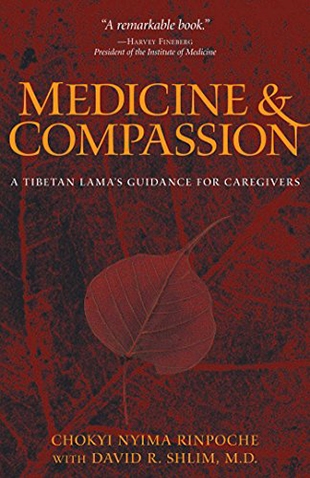Tibetan medicine dates back over 2,500 years and charts three basic types of disease: physical disorders, bad energy, and emotional disorders. Medicine is taught as one of the five topics of knowledge in Tibetan Buddhist training centers. This edifying paperback is based on the transcripts of two courses offered in 2002 by Tibetan lama Chokyi Nyima Rinpoche, "Medicine and Compassion" and "Medicine and Wisdom." It has been put together under the auspices of David R. Shlim, M.D., who ran the world's busiest destination travel medicine clinic in Kathmandu, Nepal, for 15 years. In the preface, he notes that the word compassion rarely shows up in medical literature:
"Doctors fear that if they open themselves up to the emotions of their patients, they will be overwhelmed. They feel that they need to distance themselves from the pain, loneliness, and fear that many patients are suffering. If they identify too closely with their patients, they run the risk of emotional exhaustion. Emotional exhaustion can interfere with their ability to make clear decisions, so they try to maintain an objective distance, a distance that the patient interprets as not caring enough. In this way, doctors have built an emotional Catch-22 into the practice of medicine: the only way they feel they can care more for patients is by not caring too much."
Chokyi Nyima Rinpoche argues that compassion is desperately needed in the healing arts. He defines it as "the sincere wish to alleviate the suffering of another." Some of the topics he covers include what patients are looking for; impermanence, the body, and the senses; the key to compassion; learning to meditate; coping with difficult patients and situations; easing the process of dying; and the true meaning of death and dignity.
Chokyi Nyima Rinpoche makes a good case for compassion in the treatment of the sick and the dying. He does so with commendable wisdom and deep insight into human nature.
